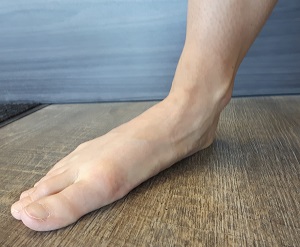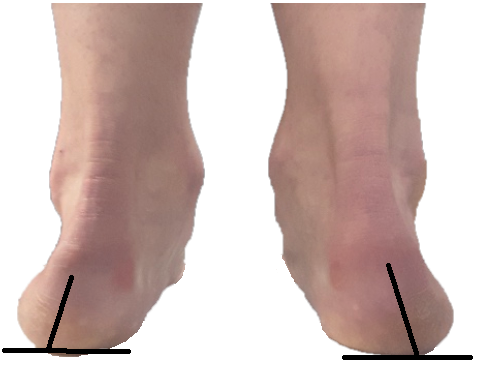
Posterior Tibial Tendon Dysfunction (PTTD)
What is Posterior Tibial Tendon Dysfunction (PTTD)?
Posterior tibial tendon dysfunction (PTTD) occurs when the tibialis posterior muscle is not functioning properly. This muscle originates on the inside of the lower leg (tibia), travels around the inside of the ankle (medial malleolus) and attaches to a few structures under the bottom of the foot. It helps to prevent the arch and the ankle from rolling in/collapsing. When this muscle stops working or breaks down, the ankle and the arch roll in as the muscle cannot support them anymore.
Causes of Posterior Tibial Tendon Dysfunction (PTTD)

Mechanics
When collapse at the arch and heel (rearfoot) occur, excessive load is placed on the posterior tibialis muscle and tendon. As you walk with this pronation/collapse, the tibialis posterior is overworking with every step. Eventually, the muscle may break down to the point where it stops functioning properly. If this occurs, the tibialis posterior may not be able to support the arch anymore, and in the worst case collapsing it completely. There are other supporting structures that hold the arch up, but once the tibialis posterior fails, the other structures are not strong enough to support the arch on their own and are at risk of further damage and/or pain.
Disease
There may be diseases that affect the tibialis posterior function, such as diabetes or rheumatoid arthritis. If you believe a disease may be affecting your muscle function, speak to your family doctor for more information.
Injury
When an injury occurs to the tibialis posterior muscle, this either may accelerate/begin the tibialis posterior tendon dysfunction or create the dysfunction. If your arch collapses after an injury, it may be an indication that the tibialis posterior has been affected.
What will I feel and see?
One of the more common visible signs of tibialis posterior tendon dysfunction is a sudden collapse of the arch, on one or both feet. In the later stages of the dysfunction, the foot collapses to the point where is lies completely flat on the floor with the ankle turning in. Another sign of the arch collapse is when the foot begins to turn outwards while walking.
Other signs of dysfunction are swelling on the inside of the foot, excessive wear on the inside of your shoe soles, having issues walking long distances or issues raising up your heels due to instability, weakness and/or pain.

To help prevent posterior tibial tendon dysfunction, look for the arch collapsing and the heel turning in (pronation). This collapse/pronation puts higher strain on the tibialis posterior muscle.
Pedorthic Treatments
Orthotics
Custom orthotics help to support the arch to reduce excessive strain to the posterior tibial tendon. Custom orthotics are typically recommended compared to over the counter inserts. This is because custom inserts provide extra heel (rearfoot) support to further reduce strain on the tibialis posterior muscle. The extra support is also beneficial to prevent other supporting structures from becoming overworked.
Footwear
Proper footwear compliments the support from an orthotic or ankle-foot orthoses (AFO) to reduce strain to the posterior tibial tendon. Along with modifications to footwear, they help to accommodate any deformities associated with the dysfunction that may be present.
Other
In more severe cases, an AFO (ankle-foot orthoses) may be necessary. This orthotic comes up the back of the leg to support the ankle as well as the bottom of the foot. If you require an AFO, an orthotist should be able to help you with this.
Surgery may be necessary with a tendon rupture, which can be discussed with a surgeon if needed.
If it sounds like the condition you have, or you would like more information, feel free to contact us!

You must be logged in to post a comment.